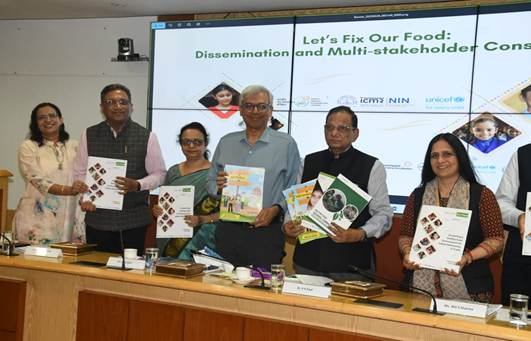New Delhi: The Let’s Fix Our Food (LFOF) Consortium, led by the Indian Council of Medical Research-National Institute of Nutrition (ICMR-NIN), Public Health Foundation of India (PHFI), and UNICEF-India, along with esteemed national and international partners, convened a dissemination and stakeholder consultation at ICMR, New Delhi today. The initiative marks a crucial step toward addressing the rising prevalence of overweight and obesity among Indian adolescents by tackling factors influencing their food environments.
During the consultation, Key Policy Briefs and Nutrition Literacy Resources were released by Dr. V.K. Paul, Member, NITI Aayog, and Dr. Rajiv Bahl, Secretary, Department of Health Research, Government of India and Director General, ICMR, in the presence of Dr. Bharati Kulkarni, Director, ICMR-NIN.
Highlighting the urgency of the issue, Dr. V.K. Paul emphasized that adolescent obesity is an emerging crisis with long-term consequences on public health and economic productivity if left unaddressed. He lauded the LFOF Consortium’s efforts in generating evidence-based policies and advocating for healthier food environments.
Dr. Rajiv Bahl stressed that investing in adolescent nutrition is a national imperative. He called for robust interventions, including restrictions on food advertising targeted at children, taxation on high-fat, sugar, and salt (HFSS) foods, and nutrition literacy programs, to promote healthier dietary habits. Dr. Bharati Kulkarni further emphasized that beyond scientific research, advocacy and thought leadership play a key role in shaping effective nutrition policies. She noted that the LFOF Consortium’s findings will aid in promoting skill-based nutrition literacy among adolescents, empowering them to make informed and healthy food choices.
The event saw the release of crucial policy briefs and research outputs, including findings from over 163,000 youth voices collected through the U-report digital channel. Other releases included guidelines on regulating food advertisements and marketing, taxation on HFSS foods, strategic behavior change communication (SBCC), and a Model School Nutrition Curriculum to integrate food education into school programs. A Food Label Reading Comic Book was also introduced to enhance adolescent nutrition literacy.
The LFOF initiative, with ongoing technical support from UNICEF and PHFI, has consistently prioritized adolescent participation through e-dialogues, youth ambassador networks, and food literacy programs. Two adolescent representatives shared their perspectives on the obesogenic food environment and its impact on their food choices and health.
A panel discussion explored strategies to strengthen multi-sectoral collaboration in fostering healthier food environments. Experts deliberated on regulatory measures, adolescent-led advocacy, and fiscal policies, such as taxation on unhealthy foods, to address the growing obesity epidemic.
Building on over two years of research and advocacy, the LFOF Consortium aims to scale up nutrition literacy programs, strengthen advertising regulations, advocate for a health tax on sugary drinks and HFSS foods, and create healthier school and home environments through integrated national nutrition programs.
The consultation saw participation from senior representatives of the Ministry of Health and Family Welfare (MoHFW), Food Safety and Standards Authority of India (FSSAI), Directorate General of Health Services (DGHS), Ministry of Education, Central Board of Secondary Education (CBSE), World Health Organization (WHO), United Nations Children’s Fund (UNICEF), International Food Policy Research Institute (IFPRI), Public Health Foundation of India (PHFI), Resolve to Save Lives, as well as school students and teachers. The discussions reaffirmed a collective commitment to protecting adolescent health and transforming India’s food landscape.





